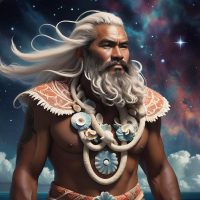Roua : The Creator God
Listen
At a glance
| Description | |
|---|---|
| Origin | Tahitian Mythology |
| Classification | Gods |
| Family Members | Fati (Son). Taonoui (Wife) |
| Region | Society Islands, Tahiti, |
| Associated With | Creation |
Roua
Introduction
Roua holds profound significance within Tahitian and Society Islands mythology, particularly as the creator god revered in the Tuamotu archipelago. Revered under various names such as Rahoua or Tubua, Roua’s influence is intricately woven into the cultural and spiritual tapestry of these islands. Among the pantheon of diverse deities in Tahiti and the Society Islands, Roua emerges as a distinct figure, commanding reverence as the creator god specifically associated with the Tuamotus.
Physical Traits
Roua’s physical attributes are not clearly delineated within the annals of mythology. In Polynesian lore, deities often assume diverse forms, incorporating elements of animals, celestial bodies, or natural phenomena. Regrettably, detailed depictions of Roua’s appearance are notably sparse in Tahitian legends. Unlike the vivid portrayals of certain Polynesian gods, Roua remains veiled in mystery regarding his bodily manifestation. This lack of specificity fosters an environment of individual interpretation, enabling a personal rapport with the deity based on one’s imaginative faculties.
Family
Roua assumes a pivotal role within the Tahitian pantheon, recognized as the progenitor of Fati, the esteemed deity of the Moon. Additionally, Roua is credited with the creation of the stars, which he sired alongside Taonoui. This celestial lineage underscores Roua’s stature as a creator god and his profound connection to the cosmos. In Tahitian mythology, Roua holds the esteemed title of father to Fati, the revered god of the moon. In some renditions of the myth, Fati is believed to have emerged from Roua’s union with Taonoui, the earth goddess. This lineage firmly situates Roua at the very nexus of the celestial realm, responsible for birthing the illuminating presence of the moon and adorning the vast expanse of the night sky with the shimmering stars.
Other names
Roua is not only recognized by his primary name but also by alternate appellations such as Rahoua and Tubua. These varying names exemplify the intricate oral tradition of Polynesian mythology, where gods and legends may possess different identities and interpretations across diverse islands and cultures. While widely known as Roua, the creator deity of the Tuamotus, he assumes alternative identities in various Tahitian narratives. In some accounts, he is referred to as Rahoua, hinting at a potential correlation with the Maori creation myth, wherein Rangi (the sky father) and Papa (the earth mother) feature prominently in the genesis of the world. Furthermore, the designation Tubua emerges in select tales, possibly indicating a connection to distinct regional variations within Tahitian mythology.
Powers and Abilities
In his capacity as the creator god of the Tuamotus, Roua wields formidable power, most notably demonstrated in his ability to shape celestial entities. He is credited with the conception of Fati, the moon god, and the genesis of all stars in conjunction with Taonoui. This attribution underscores Roua’s mastery over cosmic forces, affirming his status as a primordial creator deity. Renowned as the architect of the Tuamotus, Roua’s dominion extends beyond mere terrestrial realms. According to legend, he is credited with summoning the islands from the depths of the ocean, underscoring his role as a potent and generative force that forged the very landscape of the archipelago. Moreover, his association with the night sky hints at his potential sway over celestial bodies, including the stars and the moon, alongside his progeny, Fati. Although explicit details regarding Roua’s abilities beyond creation remain elusive, his portrayal as the architect of the Tuamotu islands endows him with an aura of boundless power and influence over the natural world.
Modern Day Influence
Despite the official suppression and subsequent abandonment of traditional religion in the 19th century, such as the conversion to Christianity by the native inhabitants, the legacy of figures like Roua perseveres into modern times. The narratives and mythologies surrounding Roua and other deities continue to exert a profound influence on the cultural ethos of the Society Islands, serving as poignant reminders of the vibrant heritage that once prevailed across these shores. Although the traditional customs of Tahitian mythology have yielded ground to Christian beliefs, Roua maintains relevance in contemporary society. His name reverberates through various cultural avenues, underscoring the enduring resonance of ancient tales.
For instance, the “Association Roua Mataara,” a non-profit organization, stands as a testament to this enduring legacy, striving to uphold and celebrate Tahitian culture and language. The incorporation of Roua’s name in such initiatives underscores his symbolic significance in preserving cultural identity and heritage. Furthermore, modern artists and writers draw inspiration from Roua and other mythological figures, reimagining their narratives to bridge the chasm between past and present. Through these creative endeavors, Roua’s legacy evolves, resonating with contemporary audiences and ensuring its continued relevance in the ever-changing tapestry of Tahitian culture.
Related Images
Frequently Asked Questions
What is lorem Ipsum?
I am text block. Click edit button to change this text. Lorem ipsum dolor sit amet, consectetur adipiscing elit. Ut elit tellus, luctus nec ullamcorper mattis, pulvinar dapibus leo.
What is lorem Ipsum?
I am text block. Click edit button to change this text. Lorem ipsum dolor sit amet, consectetur adipiscing elit. Ut elit tellus, luctus nec ullamcorper mattis, pulvinar dapibus leo.
What is lorem Ipsum?
I am text block. Click edit button to change this text. Lorem ipsum dolor sit amet, consectetur adipiscing elit. Ut elit tellus, luctus nec ullamcorper mattis, pulvinar dapibus leo.
What is lorem Ipsum?
I am text block. Click edit button to change this text. Lorem ipsum dolor sit amet, consectetur adipiscing elit. Ut elit tellus, luctus nec ullamcorper mattis, pulvinar dapibus leo.
What is lorem Ipsum?
I am text block. Click edit button to change this text. Lorem ipsum dolor sit amet, consectetur adipiscing elit. Ut elit tellus, luctus nec ullamcorper mattis, pulvinar dapibus leo.






